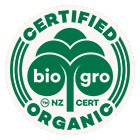Sustainability
Monavale Blueberries is located in the Moanatuatua Swamp area, approximately 1 kilometre east of the Moanatuatua Wetland. The land consists of an ‘oligotrophic’ peat approximately 7 metres deep, with the main source of water being rainwater. As rainwater has a low nutrient content, oligotropic peats have low fertility and are acid. This peat is often referred to as a raised bog. The sustainability of peat soils is of cultural value to all New Zealanders and Monavale Blueberries are passoniate about preserving this peat for future generations.
The properties that form part of Monavale Blueberries were purchased over a period of eleven years starting from 1985. As the properties had never been farmed before, this made them ideal to farm organically.
Monavale Blueberries Limited has full BioGro New Zealand organic status. Their reasons for this are threefold. Firstly they want to farm their land in an environmentally sustainable, natural and chemical free way. Secondly, they want to provide those who wish to eat healthily with a good quality, nutrient-rich, organically certified product. Thirdly, they wanted to maintain a healthy and chemical-free lifestyle as each of the three families that form Monavale Blueberries, live on the property.
Monavale Blueberries was the first substantial sized orchard in New Zealand to grow blueberries organically, and remains the largest. A safe and healthy working environment was paramount, as the owners not only work, but also live on the orchard. Growing organically involves a lot of extra time and resources, compared with non-organic growing. Costs include certification processes (BioGro, iFoam); buying organic fertilisers; and maintaining the property organically is much more labour intensive than conventional farming (hand weeding, scrubcutting, mowing etc). These extra costs are outweighed by the positive environmental impact and sustainable land management benefits that growing organically generates along with producing a high quality and nutrient rich product.
Beneficial micro organisms and biology is promoted ensuring the preservation of peat and the creation of humus. Preliminary calculations show that due to their land management practices, Monavale Blueberries sequestrate more carbon from the atmosphere than they release. However, under the current Kyoto Protocol this method of sequestration has not been accepted and therefore Monavale Blueberries cannot be officially recognised as Carbon Fixers. Monavale Blueberries believe that in the near future this will change and they will be able to be recognised as Carbon Fixers.
Monavale Blueberries pride themselves on being organic. In addition to providing customers with a healthy chemical free product they are using sustainable land management practices, which benefits the wider community.


